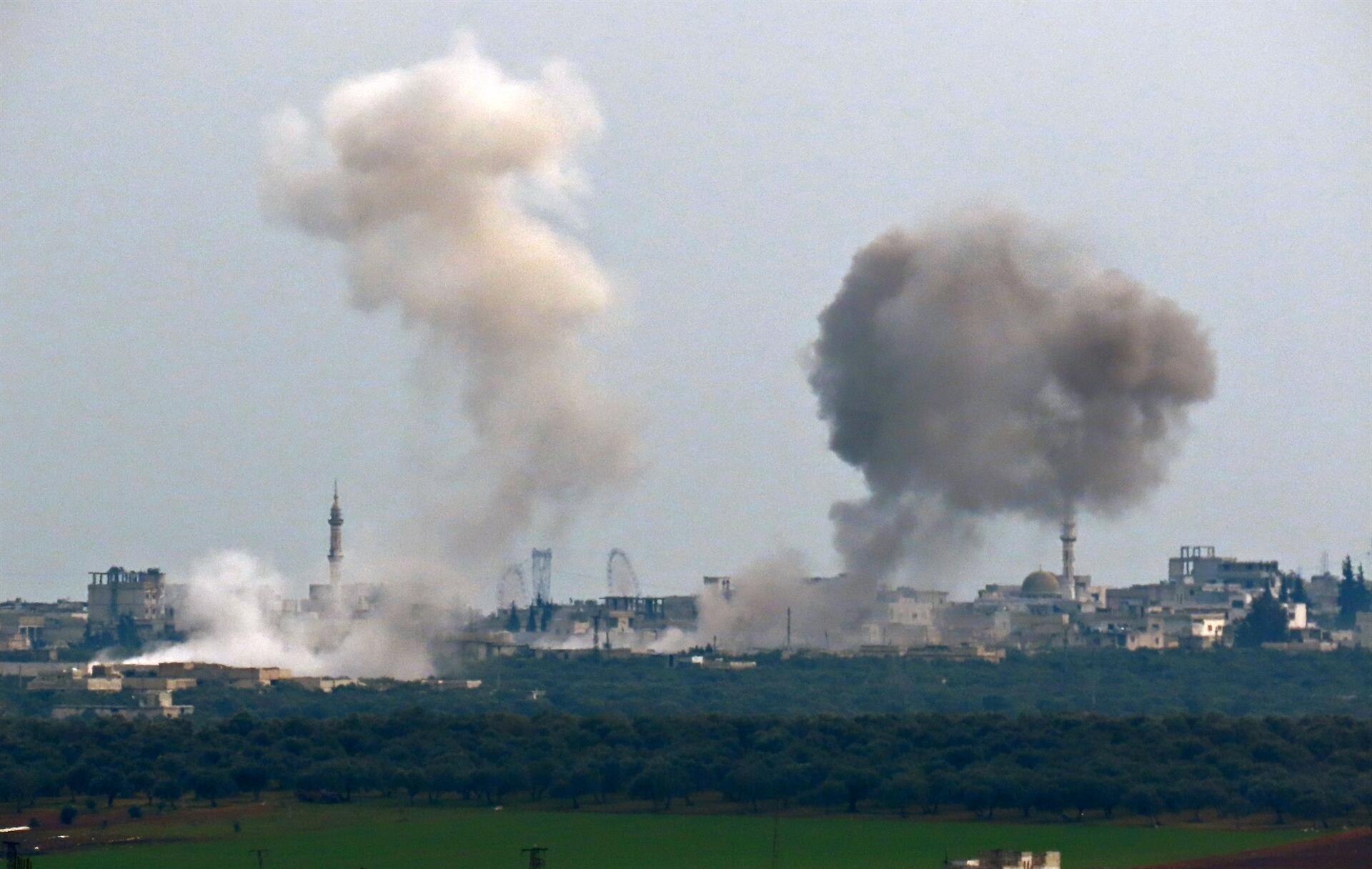
AFP Photo
Five civilians died on Feb. 24 in Russian air strikes backing Syrian regime forces as they chip away at the country’s last major rebel bastion, a war monitor said.
The Syrian Observatory for Human Rights said the deadly raids hit the area of Jabal al-Zawiya in the south of Idlib province.
The Britain-based monitor says it determines who carried out an air strike according to flight patterns, as well as ammunition and aircraft involved.
It said regime forces had rapidly gained ground in the southern part of Idlib in the past 24 hours.
They have seized "several towns and villages" south of the M4 highway linking the coastal regime stronghold of Latakia to government-held second city Aleppo, it said.
Observatory chief Rami Abdel Rahman said the regime's ultimate aim was to wrest back parts of the M4 still under control of the jihadists and allied rebels.
That would require operations against the towns of Ariha and Jisr al-Shughur, both along the M4.
Meanwhile, the White Helmets said opposition aircraft targeted 18 residential areas. These areas include Kafr Nabl, Ehsim, Kansafra, Sufuhon, Hizareen, Kafar Aweed, Hass, Deir Sunbul villages in the south of Idlib as well as Darat Izza and Kafr Nouran towns in the west of Aleppo.
Russia’s defense ministry on Feb. 24 denied the observatory’s reports, TASS news agency reported, citing the ministry’s statement.
In recent weeks, pro-Damascus forces have taken back control of another key commercial artery running through northwestern Syria - the M5 that connects the capital with Aleppo.
They have also secured the region around the northern city, a major pre-war industrial hub.
Backed by heavy Russian air power, Syrian regime forces have stepped up a campaign to retake the last rebel stronghold in the northwestern regions of Aleppo and Idlib, sparking an exodus of nearly a million people towards a shrinking pocket along the Turkish frontier.
‘Major Crisis’
The United Nations on Feb. 24 said that northwestern Syria faces a "major protection crisis" with more than 3 million people trapped in a war zone.
"There is a major protection crisis in northwest Syria. That is the fundamental issue," Mark Cutts, the U.N. regional humanitarian coordinator for the Syria crisis, told reporters in Geneva.
"More than 3 million civilians [are] trapped in a war zone in the Idlib area, and the fighting has been forcing them into a smaller and smaller piece of land close to the Turkish border," he said.
While Turkey had said it does not want to see more refugees coming in, he added that Ankara “also supports the cross-border humanitarian operation,”
The U.N. is working very closely with Turkey to ensure that the border remains open. "This a vital lifeline for the millions of people in northwest Syria," he said.
Fears of 'bloodbath'
The fighting is now getting "dangerously close" to the area where more than a million are living in tents and makeshift shelters in an "an extremely alarming situation" due to airstrikes and shelling, he explained.
Cutts said that if people continue to move into the area, "We are no doubt going to see a real bloodbath, a real massacre of civilians in that area."
Some 400,000 people were forced to flee their homes last summer, followed by a further escalation beginning in December, he said. More than 900,000 people were forced to flee their homes.
"Since then, the numbers of displaced people are staggering. During the nine years of this war, about 12 million Syrians have been forced to flee their homes," he said.
About five-and-a-half million are refugees outside of Syria, and about six-and-a-half million are displaced inside the country.
"In northwest Syria, there are more than two-and-a-half million displaced people altogether, and that includes the 900,000 who fled in the last two months," said Cutts.
"So huge figures and a huge protection crisis. Our biggest concern is the widespread and systematic targeting of densely populated civilian areas," he said.
'Terrorized and traumatized'
Entire cities and towns and villages were emptied out, he said.
"Huge numbers of hospitals and schools and marketplaces and bakeries and water stations have been hit by airstrikes and shelling in the last few months.
"And there's a population now which is terrorized and traumatized and living in fear. People have been fleeing in fear, to the border area."
Safe zone 'best alternative'
Meanwhile, former U.S. ambassador for Syria said on Feb. 24 that the "best alternative" to prevent an all-out humanitarian catastrophe in Idlib is to institute a safe zone in the region.
"The best option that eschews direct U.S. military intervention is a safe zone located on the Syrian side of the Turkish border that is defended by Turkish artillery, missile, and antiaircraft systems located on the Turkish side of the border," Robert Ford, who was Washington's ambassador to Damascus from 2010-2014, wrote in the Foreign Affairs website.
"This might be enough to deter the Syrian military; Syrian fighters have stopped flying where the armed Syrian opposition used Turkish missiles to shoot down two Syrian helicopters earlier this month. If it is not, and Syrian ground units fire on or approach the safe zone, Turkey could counter with artillery and rocket fire, coordinating with Syrian opposition fighters," he added.
NATO should invoke Article 5 for Turkey
Ford said the "biggest potential problem" is determining how it would be implemented.
"Syrian forces would almost certainly test the safe zone, triggering a Turkish defensive response," he said. "If Russian aircraft back a Syrian incursion and shoot at Turkish units defending from inside Turkey, then NATO should invoke Article 5 to defend Turkish sovereignty and those Turkish units."
"Beyond the enormous humanitarian stakes, the likelihood of huge new refugee flows again destabilizing Europe requires NATO to stand by Turkey if its forces defend a safe zone just inside Syria," he added.
"That also means rallying the support of NATO members to back Turkish plans and to organize a humanitarian response to support the safe zone," urged Ford.